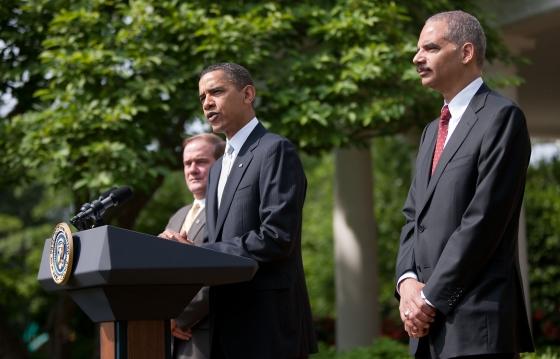As Attorney General Eric Holder on May 15 revealed few details about the probe into Associated Press phone records, momentum is building for a press shield law to prevent such a record seizure in the future.
The gathering of two months of telephone records from a spate of Associated Press reporters by the Department of Justice was announced several days ago, prompting concerns about press freedom and whether the department acted within the law. Department officials gathered the records in secret as part of an investigation into a national security leak and notified the news cooperative after the fact, without saying for what case they gathered them.
According to the Associated Press, the record seizures are probably over a May 7, 2012 story about a failed terror plot in Yemen, which relied on confidential sources. Among those whose phone records were taken were five editorial staff members involved in reporting that story.
White House officials told Politico that they asked U.S. Sen. Chuck Schumer (D-N.Y.) to reintroduce a press shield law, which would enforce stricter boundaries on record gathering in such investigations.
Schumer said he supports the law, which hasn’t passed in previous tries.
“This kind of law would balance national security needs against the public’s right to the free flow of information,” Schumer said. “At minimum, our bill would have ensured a fairer, more deliberate process in this case.”
Department of Justice officials usually have to give media organizations notice before seizing records, but there are a few exceptions, including if doing so “would pose a substantial threat to the integrity of the investigation,” according to the department. That’s the exception department officials are citing in this case.
President Barack Obama also supports a federal press shield law. “The president has long supported media shield legislation,” said White House spokesman Jay Carney.
Schumer’s proposal is similar to many state shield laws that protect reporters from having to disclose the names of confidential sources.
Several representatives said they support a federal shield law during the hearing at which Attorney General Holder testified at on May 15, including Rep. Bob Goodlatte (R-Va.).
Holder said he had few details to share, because he recused himself from the investigation. He said he recused himself because the FBI had interviewed him about the national security leak. He confirmed that Deputy Attorney General Jim Cole ordered the phone record seizures.
Rep. Zoe Lofgren (D-Calif.) said she had trouble understanding how the probe happened and didn’t understand why Holder recused himself. “I realize there are exceptions and you have recused yourself, but it seems to me clear that the actions of your department have in fact impaired the First Amendment,” she said. Confidential sources will “be chilled” in their relationships with the press, she said.
After the Associated Press probe, many journalist organizations called for such a law.
“This incident proves once again the need for a federal Shield Law,” Sonny Albarado, national president of the Society of Professional Journalists, said in a statement. “Prosecutors, unlike reporters, have subpoena power to compel testimony, yet lazy prosecutors often prefer to go after reporters’ notes and records rather than do the hard investigative work to dig out information without trampling on the First Amendment.”
Additional reporting by Shar Adams





